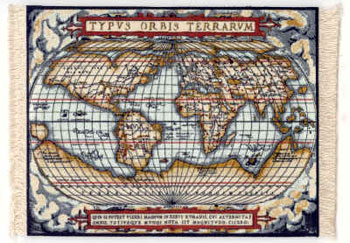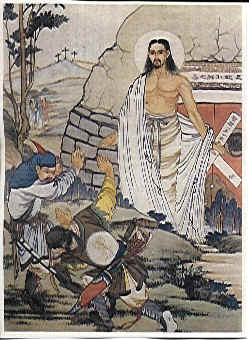Our Global God: Witness with Power
For Sunday May 8, 2005
Lectionary Readings (Revised Common Lectionary, Year A)
Acts 1:6–14
Psalm 68:1–10, 32–35
1 Peter 4:12–14; 5:6–11
John 17:1–11
 |
Old World map. |
Try this thought experiment.
Imagine yourself back in time and space as one of the original Christian apostles. You stumbled and bumbled your way around Judea, following an itinerate rabbi named Jesus. The longer you followed, the less you understood and the more you misread his message. Most of your inclinations about Jesus were wrong. You despised the dirty Samaritans; he told stories that featured them as heroes. You were fastidious about ritual purity while he partied with the "unclean" poor so much that people ridiculed him as a glutton and drunkard. You wanted to call down fire from heaven to punish sinners; he befriended them. Most of all, whereas you dreamed that he might inaugurate a political kingdom to liberate Israel and vanquish the hated Romans, he spoke of a rule and reign of God that was spiritual in nature and which welcomed everyone.
After three years the Roman authorities had had quite enough of his seditious ways, thank you, so, as political powers are wont to do, they arrested him and sentenced him to a violent death. In fits of cowardice and betrayal, despite his bragging bravado, your leader Peter denied even knowing Jesus, and your compatriots all fled for the tall grass. After his death you cowered behind locked doors. Then, a preposterous report maintained that he was alive from the dead. As an eyewitness, you did not understand this but could not deny it. Jesus then spoke these words to you which Luke records in his narrative for this week: "You will receive power when the Holy Spirit comes upon you; and you will be my witnesses in Jerusalem, and in all Judea and Samaria, and to the ends of the earth" (Acts 1:8).
Power? Witnesses? The ends of the earth?!
 |
African woman. |
Two millennia later, Jesus's improbable prediction has become an undeniable empirical reality. Luke's Acts of the Apostles begins in Jerusalem, proceeds geographically outward, and in his final chapter ends with Paul imprisoned in the imperial city of Rome. And that was only a modest beginning. Today the Christian church just might be the best example of wholesale globalization.
As one of those first, incredulous followers of Jesus, could you in your wildest imagination ever have believed that two thousand years later your first, halting efforts at bearing witness to the Jesus Way would have resounded to every corner of the globe? But such is the case. This "Journey with Jesus" webzine is a simple case in point. Launched less than a year ago (June 23, 2004), Christian readers from at least 145 countries have visited our site. As I write I marvel as our log files indicate new readers from Albania, Guyana, Micronesia, Ireland and Saudi Arabia. It turns out that Luke spoke literally and not just figuratively about witnessing to "the ends of the earth." Although there has never been a time, place, culture, language, philosophy, science, or world view with which the Gospel has been entirely compatible or consonant, paradoxically "there has also never been any picture of the world within which the confession of the faith has proved to be altogether impossible."1
As early as 1982 the World Christian Encyclopedia documented a trend that has become a truism, that today the overwhelming pulse and energy of the Gospel has moved from white believers in Europe and North America to people of color in Africa, Asia and Latin America. "The centers of the church's universality [are] no longer in Geneva, Rome, Paris, London, and New York," writes the Kenyan theologian John Mbiti, "but in Kinshasa, Buenos Aires, Addis Ababa, and Manila" [Quoted in Philip Jenkins, The Next Christendom; The Coming of Global Christianity (New York: Oxford University Press, 2002), p. 2.] I suspect that the widespread experience of this globalized Gospel is what fueled at least some of the disappointment about the appointment of Joseph Ratzinger as the new Pope Benedict XVI. By all accounts he is a personally gracious man and a brilliant scholar, albeit a dogmatic hard-liner, and in fairness we should wait to see what he says and does. But the appointment of a 78-year old white male from religiously moribund Europe feels very "old school," as my children would say. It looks and feels more backward-looking than forward-reaching.
 |
Manuscript leaf from Armenian Bible, 14th century. |
Luke's word "witness" (Greek martyr) eventually became a technical term for Christians who died for their faith, and such was not uncommon for the first 300 years of the church. If we ask what it meant to "witness" in the original sense of the word, the record is clear. When they selected a replacement for Judas, the disciples agreed upon one criterion: "For one of these must become a witness with us of his resurrection" (Acts 1:22). Similarly, in his first address to a large crowd, an emboldened Peter proclaimed, "God has raised this Jesus to life, and we are all witnesses of the fact" (Acts 2:32). The apostolic witness to "the ends of the earth" has been that God raised Jesus from the dead, and that he will do the same for you and me.
What does witnessing to the resurrection look like today, two thousand years later? I think the writer, agrarian and iconoclast Wendell Berry points us in the right direction when he suggests that we offer a powerful, radical "witness" to Jesus when we "live resurrection." Such is the two-word conclusion to his provocative Manifesto: The Mad Farmer Liberation Front:
Love the quick profit, the annual raise,
vacation with pay. Want more
of everything ready-made. Be afraid
to know your neighbors and to die.
And you will have a window in your head.
Not even your future will be a mystery
any more. Your mind will be punched in a card
and shut away in a little drawer.
When they want you to buy something
they will call you. When they want you
to die for profit they will let you know.
So, friends, every day do something
that won't compute. Love the Lord.
Love the world. Work for nothing.
Take all that you have and be poor.
Love someone who does not deserve it.
Denounce the government and embrace
the flag. Hope to live in that free
republic for which it stands.
Give your approval to all you cannot
understand. Praise ignorance, for what man
has not encountered he has not destroyed.
Ask the questions that have no answers.
Invest in the millennium. Plant sequoias.
Say that your main crop is the forest
that you did not plant,
that you will not live to harvest.
Say that the leaves are harvested
when they have rotted into the mold.
Call that profit. Prophesy such returns.
Put your faith in the two inches of humus
that will build under the trees
every thousand years.
Listen to carrion — put your ear
close, and hear the faint chattering
of the songs that are to come.
Expect the end of the world. Laugh.
Laughter is immeasurable. Be joyful
though you have considered all the facts.
So long as women do not go cheap
for power, please women more than men.
Ask yourself: Will this satisfy
a woman satisfied to bear a child?
Will this disturb the sleep
of a woman near to giving birth?
Go with your love to the fields.
Lie down in the shade. Rest your head
in her lap. Swear allegiance
to what is nighest your thoughts.
As soon as the generals and the politicos
can predict the motions of your mind,
lose it. Leave it as a sign
to mark the false trail, the way
you didn't go.
Be like the fox
who makes more tracks than necessary,
some in the wrong direction.
Practice resurrection.
 |
Chinese depiction of the resurrection. |
As Berry and others have pointed out, globalization in the economic, technical, and cultural spheres has had at least some catastrophic consequences for human community and environment. Even its economic benefits pale in comparison, in scale and in scope, to "practicing resurrection." For two thousand years that has been the "witness with power" of billions of Christians from the ends of the earth.
[1] Jaroslav Pelikan, Credo (New Haven: Yale, 2003), p. 510.





